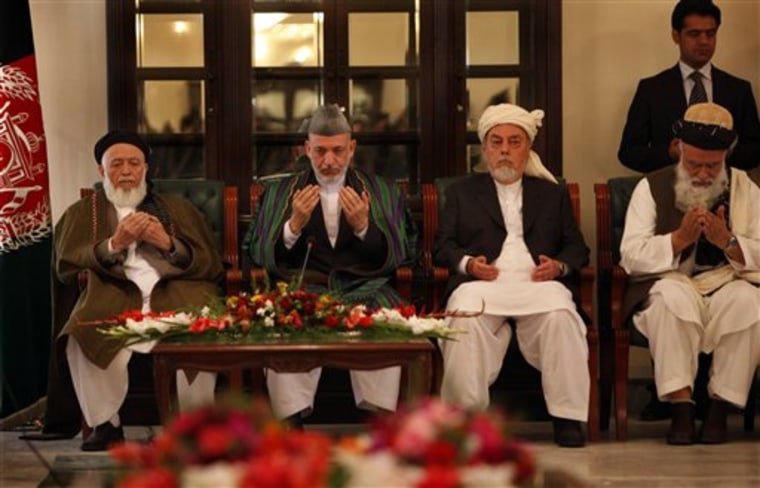The Obama administration is offering advice and following the initial peace talks between the Afghan government and the Taliban, Defense Secretary Robert Gates told a news conference Thursday at NATO headquarters in Belgium.
He spoke shortly after a former Afghan president who heads a new peace council said he's convinced the Taliban are ready to negotiate peace.
Gates said the U.S. is a partner with the Afghan government even though U.S. officials aren't sitting at the table.
Any reconciliation between Afghan President Hamid Karzai's government and the Taliban insurgents must be led by Afghans, he added.
The Obama administration's position is sensitive, because taking any role in talks with the Taliban risks criticism within the U.S.
"One of the principles we have established with President Karzai is transparency with one another as this process goes forward so we know what they are doing, they know what we are doing and they understand what our requirements are," Gates said. "And frankly, we share with them what we think will be in their own best interest as the process goes along."
Gates added: "It's basically a partnership as we go forward with this with clearly the Afghans in the lead. I think we're confident that we have access into this process and plenty of opportunities to make our concerns as well as our suggestions known."
His comments came after the revelation Wednesday that NATO was providing safe passage to Taliban officials engaged in settlement talks, the clearest sign yet that the U.S. takes Kabul's discussions with the insurgents seriously.
Previously, the Afghan government has acknowledged that it has been talking with the Taliban, but discussions between the two sides have been described as mostly informal and indirect message exchanges relying on mediators.
Former Afghan President Burhanuddin Rabbani told reporters in Kabul Thursday that the Taliban have not completely rejected the idea of negotiating a nonmilitary resolution of the war.
"They have some conditions to start the negotiations process. It gives us hope that they want to talk and negotiate," Rabbani said.
"We are taking our first steps," he said. "I believe there are people among the Taliban that have a message that they want to talk. They are ready."
The Afghan government has acknowledged that it has been involved in reconciliation talks with the Taliban, but discussions between the two sides have been described as mostly informal and indirect message exchanges relying on mediators.
'Baseless propaganda'
The Afghan Taliban, meanwhile, have denied having discussions.
In a message posted on its website this week, the group said the notion of talks with the enemy was "baseless propaganda" and that negotiations would be a "waste of time."
One expert on Afghan affairs cautioned against expecting peace anytime soon.
"I don't think we can deduce from (Rabbani's) statement that there's some imminent breakthrough likely," said Professor Malcolm Chalmers, an analyst at the Royal United Services Institute, a British defence and security think tank.
"People have been talking about the possibility of negotiating with elements of the Taliban for some time. There's a big difference between discussions and serious negotiations," he told msnbc.com.
"Everything I have heard would suggest people are putting out feelers and finding out who is interested in what, but on both sides — the different Taliban groups and the government — they are also trying to identify divisions and possible weaknesses," he said.
And the insurgents are not being forced to the negotiating table. While NATO's campaign was hurting the Taliban, especially in the south, insurgents were making gains in other parts of the country, Chalmers said.
Safe passage for TalibanIn Brussels on Wednesday, a senior NATO official confirmed that it has provided safe passage for top Taliban leaders to travel to Kabul for face-to-face negotiations with the Afghan government.
It was the most detailed indication so far of U.S. and NATO support of clandestine talks aimed at bringing an end to the 9-year-old war. The official spoke on condition of anonymity because he was not authorized to describe the subject publicly.
Mohammad Masoom Stanekzai, a top adviser to Afghan President Hamid Karzai who also spoke with reporters, confirmed the contacts that were conducted with coalition support.
"There are people who have had contacts between the Afghan government and the Taliban," Stanekzai said, declining to identify the players. "The elders of this country, the clerics of this country — they can mediate to form a bridge."
He said those who want to join to the peace process must be provided safety and security.
"The comings and goings are continuing," he said. "We are now at the beginning steps of our work."
'World's most effective peacekeeper'
Rabbani's comments came as ministers met Thursday to chart NATO's course for the next decade.
On the eve of the meeting, a senior NATO official confirmed NATO forces in Afghanistan were facilitating contacts between senior Taliban officials and the Afghan government.
But officials said discussions were in their very early stages and no quick end to the nine-year-old conflict could be expected.
NATO Secretary-General Anders Fogh Rasmussen wants input from foreign and defense ministers for a new NATO "Strategic Concept," or vision statement, to be agreed by leaders of the 28-nation alliance at a November 19-20 summit in Lisbon.
"NATO's core mission to protect the 900 million citizens of NATO countries from attack must never change, but it must be modern defense against modern threats," Rasmussen said.
"NATO is the world's most effective peacekeeper. But to stay effective we need to be engaged with our civilian partners and we must reach out to partners around the world that want to make the world safe," he told the meeting in Brussels.
Gates said Wednesday he was concerned that cuts in Europe threatened to put more pressure on an increasingly stretched U.S. military.
Britain is expected to cut 10 percent from its 36.9-billion pound ($58.4 billion) budget, while experts at Germany's defense ministry have listed potential savings of more than 9.3 billion euros ($13 billion).
